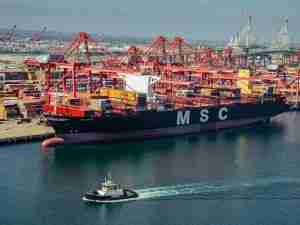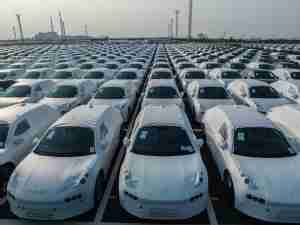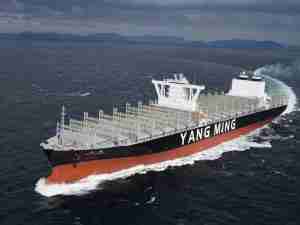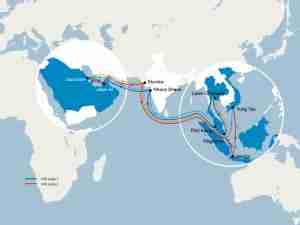Shipbuilding Recovery Dims as Samsung Heavy Plunges on Outlook
By: Kyunghee Park | Dec 06 2017 at 04:00 AM | Maritime
Samsung Heavy Industries Co. slumped 29 percent in Seoul trading, wiping $1.3 billion off its market value, after forecasting surprise losses and saying it needs to raise more cash—dimming signs of a recovery in global shipbuilding.
The world’s third-largest shipbuilder said Wednesday it plans to plug a cash-flow shortage by selling 1.5 trillion won ($1.4 billion) of new shares, its second rights offering in as many years. Dwindling demand for new vessels and offshore projects will push the company into losses this year and next, compared with analyst estimates for a profit.
The outlook suggests the company hasn’t trimmed costs fast enough to stem an earnings slide. Shipyards from South Korea to Singapore have been struggling to emerge from losses since the global financial crisis amid excess global capacity and a plunge in oil prices that damped demand for vessels and offshore drilling rigs. Last year was the worst for the industry, with the collapse of Hanjin Shipping Co., previously among the world’s largest container lines, and freight rates tumbling to record lows.
“Things are really getting bad for Samsung Heavy because they have been slow to respond to the weakening market conditions,” said Park Moo Hyun, an analyst at Hana Financial Investment Co. in Seoul. “It’s not going to look good for the company next year.”
Surprise Losses
Operating losses will widen to 490 billion won this year and 240 billion won in 2018, the company said in a statement. It had operating losses of 147.2 billion won last year and 1.5 trillion won in 2015.
Analysts were expecting Samsung Heavy, based in Seongnam, South Korea, to post operating profit of 90 billion won this year, according to the average of estimates compiled by Bloomberg.
The bleak outlook triggered a record plunge in Samsung Heavy shares. The stock fell 3,640 won to close at 8,960 won, the lowest level in a year, cutting the company’s market value to 3.49 trillion won. Shares of bigger rivals Daewoo Shipbuilding & Marine Engineering Co. dropped 2.7 percent to 17,700 won and Hyundai Heavy Industries Co. fell 6.2 percent to 143,500 won.
“The real problem in the shipping industry isn’t any more with the shipping market, it’s in the shipyards,” said Rahul Kapoor, an analyst at Bloomberg Intelligence in Singapore. “They are overly bloated in terms of their cost structure. The days of the big ordering activities that we’ve seen in the past 10 years are over.”
The industry won’t return to profitability until 2019, Kapoor said.
Less Cash
Samsung Heavy’s cash and cash equivalents totaled 451 billion won as of Sept. 30, less than half the 984.1 billion won on hand at the end of 2016. Employees directly hired by the shipyard fell 18 percent to 11,263 from 13,788 at the end of 2015.
“Cash flow is really getting tight because they haven’t been winning a lot of orders, while rivals like Hyundai Heavy have been quite active in trying to win orders,” Hana Financial’s Park said. Samsung Heavy hasn’t been very forthcoming with some of the cost overruns caused by delivery delays on offshore projects, he said.
Hyundai Heavy doesn’t expect any problems with its cash flow, a company spokesman said. It has been carrying out a restructuring plan, selling assets and spinning off operations into four companies, the official said.
Daewoo Shipbuilding and Hyundai Heavy have both said they would take fewer orders for offshore drilling rigs as part of restructuring plans submitted to creditors, whereas Samsung Heavy has sought to strengthen its offshore capabilities—a plan that appears to have backfired, Park said.
Also Samsung Heavy has relied more on selling shares to revamp its business, while Daewoo Shipbuilding and Hyundai Heavy have focused more on selling assets and cutting jobs, he said.
Bank Support
Daewoo Shipbuilding doesn’t see any problem with its cash flow until the end of next year, a company spokesman said. Daewoo has so far used about 600 billion won of the 2.9 trillion won that was pledged to the shipyard by state-owned Korea Development Bank earlier this year. Its creditors have also agreed to extend maturities on debt by as much as five years.
Samsung Heavy, saddled with 3.3 trillion won of short-term debt, said it expects to complete the share sale by May as it takes preemptive measures to improve its financials. It raised 1.1 trillion won in 2016.
Samsung Electronics Co. is the largest shareholder of Samsung Heavy, with a 16.9 percent stake as of Sept. 30, according to the shipbuilder’s filing. Other major shareholders include Samsung Life Insurance Co. with 3.2 percent and Samsung Electro-Mechanics Co. with 2.3 percent.
Samsung Heavy, rated BBB+ by Korea Ratings, has sold total 255 billion won of bonds this year via private placement, and separately has 390 billion won of outstanding short-term paper, according to data from Korea Securities Depository.
Uncertainty in Samsung Heavy’s operating performance and cash flow is increasing due to delays in deliveries of offshore drilling rigs, weighing on the company’s creditworthiness, Nice Investors Service said in a note this week. The South Korean rating company has an A- rating on the shipyard.










